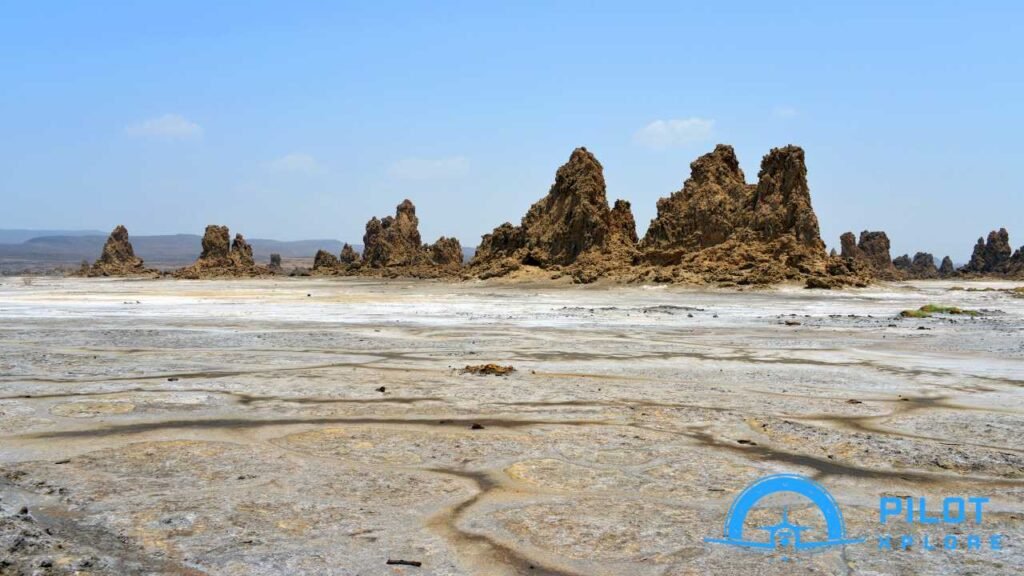Having traveled to 35 countries and explored 90 countries with my travel blogger girlfriend, the experience of visiting Djibouti in 2021 stands out—not for the right reasons. As an airline pilot, I’ve been to countless destinations, but the hassle and uncertainty during the Covid-19 pandemic made Djibouti one of the worst places to visit at that time.
Despite Djibouti having wonderful places and a rich history to admire, now is just not the right time to travel there. The pandemic has disrupted travel globally, and trying to visit this international destination right now could bring more frustration than enjoyment. As a seasoned traveler, I highly suggest waiting for a more stable time before planning a trip.
The pandemic is still a major concern, and with the ongoing Covid-19 restrictions, it’s essential to weigh your options carefully when choosing where to go next.
The PCR Test Upon Arrival Will Be a Nightmare
Upon arrival in Djibouti, after being fully vaccinated and having a negative PCR test result, the first thing you’ll face is yet another PCR test. The whole process is a hassle—you’ll be stuffed into a small room with local workers, none of whom are wearing masks and with limited airflow. You’re not going to see much in that room except long lines, and you’ll likely end up waiting for over an hour.
Once tested, you’ll be asked to pay $35USD as a “thank you,” but don’t expect to ever get your test results back. It’s honestly one of the greatest risks of catching Covid-19 during your journey. The entire experience can feel insufferable, and the risk of dealing with this, especially given the current pandemic, makes visiting Djibouti right now feel like a poor decision. If you’re thinking of visiting, you’ll quickly find that this is not the time for such travel.
The worst part wasn’t even the test. It was the suffocating room and the complete lack of safety measures. At times, it felt like we were putting ourselves at more risk by being there.

Unpredictable Entry Rules Could Leave You Stranded
When you arrive in Djibouti, the entry procedures can feel totally random. Even if you’re not a journalist or planning to cause any trouble, you could still be detained with no clear explanation. My travel blogger partner was told she had to return immediately simply for saying she was a travel blogger.
There’s a strong push against any kind of publicity in the country, and foreigners are often treated with suspicion. To make matters worse, the internet at the airport doesn’t work, and foreign SIM cards won’t work either, leaving you in the dark. We didn’t have a way to know what was going on, and locals weren’t exactly helpful—unless you’re willing to offer business in exchange for their assistance.
It’s an exhausting and frustrating process, making Djibouti a much less welcoming place than you might expect. If you visit, expect delays, confusion, and the risk of being caught up in this illogical process.
| Problem | What You Might Encounter | Impact on Traveler |
| Entry Procedures | No clear explanation for detention. | Uncertainty, frustration, and delay. |
| Suspicion of Foreigners | Especially those who are bloggers or journalists. | Risk of being treated unfairly or with suspicion. |
| Limited Internet | Airport internet doesn’t work, and foreign SIM cards fail. | Communication barriers, making the process even more frustrating. |
The entire experience felt like an obstacle course. From detention to isolation, it was a reminder that Djibouti doesn’t roll out the red carpet for travelers.

You’ll Need a PCR Test to Leave—Even If You Already Took One
Leaving Djibouti isn’t as simple as just showing your passport. You’ll need a PCR test to exit the country, and it has to be done within 72 hours of your departure. We thought we were being smart by staying less than 72 hours, but we quickly learned that your entry test, even though it’s the same as the exit test, does not count.
You never even get your results, so the process feels like a frustrating loop. If you’re planning to stay or visit, be prepared for the additional hassle of getting a PCR test just to leave, even if you’ve already done it to enter the country. This test, combined with the uncertainty around results, can make your travel plans feel more complicated than necessary.
| Exit Test Requirement | Challenge | Traveler Impact |
| Exit PCR Test | Must be done within 72 hours of departure. | Adds extra stress, especially with tight travel schedules. |
| No Result from Entry Test | Entry test doesn’t count for exit. | Time-consuming, costly, and confusing. |

Djibouti’s Only Testing Center Is a Major Hassle
If you’re planning to get tested in Djibouti, be prepared for a major inconvenience. There’s only one testing center in the entire country, and it’s only open from 8AM to 11:30. The process is a challenge. Upon arrival, you get a number and then wait in a crowded seating area until your number is called. Once inside, you pay and take your test.
The results are provided on a stamped blue piece of paper. Getting the test is one hurdle, but the timing and crowded conditions make the whole experience even more difficult. You’ll be waiting outside, hoping to get your test completed within the limited hours, which adds to the frustration of the whole process.
You can’t afford to miss your test time, because the center’s narrow window is unforgiving. Getting your test results is another obstacle in this never-ending maze of frustration.
Test Results Take 24 Hours, and You Must Pick Them Up in Person
In Djibouti, getting your Covid test results is a real challenge. After taking the test, you can expect to wait 24 hours for the results, and there’s no way around it. The system is slow, and the process is far from efficient. We learned this the hard way when we had booked our return flight within 72 hours of arrival.
Despite having ample time to get the test on day 1, we were detained until the early afternoon, and the testing center closed by 11AM. We were promised that we would get our results the same day, but it took until 11PM to get any hope. The next day, we were told to pick up our results at 7AM, but by then, our flight was already departing at 7AM.
To make things worse, at the airport, we couldn’t access our results from the first test—they wouldn’t be available until 9AM, more than 24 hours later, making it impossible to make any plans.
Explore Neighboring Countries Instead for Better Travel Experiences
When you visit Djibouti, you’ll find that its neighboring countries offer much more in terms of fascinating sights and attractions. Ethiopia, Somaliland, and Eritrea all have a lot to offer, with beautiful scenery and a variety of off-the-beaten-path tourism experiences. For example, South Sudan offers authentic vibes and friendlier people, making it a unique place for those seeking something different.
While Djibouti does have Lac Assal and other sights like Lake Abhe and the Danakil Desert, the neighboring countries pack more per square mile, giving travelers more for their time. If you want a truly diverse and rewarding travel experience, it’s worth exploring the nearby destinations instead.
Why settle for a challenging journey when Ethiopia and Somaliland are just next door, offering even more exciting adventures and easier travels.

Limited Flight Options Make Leaving Djibouti a Challenge
Flights out of Djibouti are incredibly limited right now, making travel plans tricky. Due to the effects of Covid, many international airlines have pulled out of the market, leaving only a few options. Air Djibouti is still around, but options like Turkish Airlines and Ethiopian are some of your best bets.
There’s a major shortage of civilian flights compared to military flights, with French military airplanes often dominating the skies. This leaves travelers with slim pickings when it comes to choosing their flight options. So, if you’re planning to leave Djibouti, it might not be as easy as you think.

Djibouti Is One of the Priciest Places in Africa
Djibouti is one of the most expensive places in Africa right now. Even the most basic services, like a hotel stay, can cost nearly $200 per night. Meals easily go over $20 per person, which is surprisingly high for a developing country. Taxis and everyday services are priced similarly to the US and Europe, even though Djibouti’s currency is much weaker.
Even things like SIM cards are expensive, with each gigabyte costing around $1 for just a day’s use. On top of that, the system used by the only cell provider in Djibouti can wipe out your credit before you even use your data, leading to extra costs.

The Streets Are Covered in Trash
Trash is everywhere in Djibouti. It’s especially noticeable in the city streets, roads, and sidewalks, where the garbage seems to be constantly covered and scattered around. It’s a common sight in many developing countries, but in Djibouti,
it felt particularly bad, even worse than in places like South Sudan, where we found less trash. The trash is just everywhere, making the experience far from pleasant. The amount of waste and the lack of proper disposal systems truly stand out.
Safe from Crime, but Dangerous Roas Await
Djibouti is known for being super safe when it comes to crime, with a strong military presence from countries like France, the US, Japan, and even China. The government here is less corrupt and does its job in keeping things safe for tourists. However, driving in Djibouti is a whole different story.
The roads are full of crazy driving—you’ll often see 18-wheeler cargo trucks flipped over on the side of the road, which is quite shocking. Even though Djibouti is considered the safest country in Africa, I’ve never felt as much risk on the roads as I did here, even after visiting countries like Egypt
, Peru, and Central America. Ironically, Djibouti’s highways can be just as dangerous as they are safe. The roads are erratic, and driving there can be hazardous. So, while Djibouti is safe in terms of crime, it’s a dangerous place to drive.

Limited Medical Facilities Could Leave You Vulnerable
Djibouti’s healthcare system is underdeveloped, and access to medical care can be limited, especially outside the capital. While there are a few hospitals and clinics, they often lack the necessary resources to handle serious health emergencies.
During the Covid-19 pandemic, this becomes even more concerning. Travelers may find themselves struggling to get adequate medical attention in case they contract the virus or face another health issue. The healthcare infrastructure, including access to medications and qualified medical professionals, simply isn’t up to international standards, which is another reason why Djibouti is not an ideal destination right now.
Political Tensions Could Create Uncertainty
Djibouti, although generally stable compared to some of its neighbors, has a political climate that can be unpredictable, especially in times of crisis like the Covid-19 pandemic. The government has been known to take extreme measures against any form of dissent, and tensions occasionally flare between political groups.
This can lead to heightened security measures at airports or even arbitrary detentions, as you may experience as a foreigner. The local authorities are sensitive to criticism, and travelers should be cautious about what they say or do, as being labeled as a “troublemaker” could result in significant delays or even deportation.
Limited Tourism Infrastructure Makes Travel Difficult
Djibouti’s tourism infrastructure is still in the early stages of development. While the country offers some unique attractions, such as the Danakil Desert and Lac Assal, the facilities around these sites are not well-equipped to handle tourists. Hotels are often overpriced, with limited services and amenities that fail to meet expectations for international visitors.
Additionally, transportation within the country can be unreliable and difficult to navigate. With the pandemic further limiting options, you might find it challenging to book tours, make reservations, or get accurate information about your destination, which makes Djibouti a frustrating place to explore.
Cultural Sensitivities and Restrictions Could Limit Your Experience
Djibouti is a predominantly Muslim country, and cultural norms may be quite different from what you are used to. Foreigners, especially those who are openly involved in media or blogging, may face challenges navigating the country’s strict cultural expectations.
For example, Djibouti has a relatively conservative approach to tourism, and those who might attract attention (like bloggers, journalists, or influencers) could find themselves questioned or detained. Moreover, the government places significant restrictions on movement and freedom of expression, which could make it difficult to fully experience the country without feeling under surveillance.
As such, it’s important to be aware of these sensitivities before visiting.
Frequently Asked Questions
Why is visiting Djibouti challenging during the pandemic?
Djibouti’s Covid-19 procedures are strict, with multiple PCR tests, long wait times, limited healthcare, and unpredictable conditions, making travel frustrating and difficult during the pandemic.
Is a PCR test necessary for entry into Djibouti?
Yes, you need a negative PCR test before arrival, but you’ll also undergo another test upon arrival, which can be time-consuming and inconvenient.
What’s the situation with Djibouti’s entry procedures?
Entry procedures can be unpredictable, with foreigners, especially bloggers, facing detention for unclear reasons and communication issues due to poor internet access.
Do I need a PCR test to leave Djibouti?
Yes, you need a PCR test for departure within 72 hours, but the entry test won’t be valid for your exit, adding to the hassle.
There is a single testing center in Djibouti, operating from 8 AM to 11:30 AM.
There’s only one testing center in Djibouti, open from 8 AM to 11:30 AM. The crowds and limited hours make getting a timely test challenging.
How long does it take to receive PCR test results in Djibouti?
Test results are available within 24 hours and must be collected in person. Delays and scheduling issues can make this process stressful, especially for tight itineraries.
Are there better travel destinations than Djibouti?
Yes, neighboring countries like Ethiopia and Somaliland offer more attractions and smoother travel, making them better options for a more fulfilling trip.
Are flights from Djibouti limited?
Yes, flight options are limited due to Covid-19, with only a few airlines like Air Djibouti operating, making it harder to secure a flight out.
Is Djibouti an expensive destination?
Yes, Djibouti is one of Africa’s priciest countries. Basic services, such as accommodation and meals, are expensive and comparable to prices in the US or Europe.
Is it safe to visit Djibouti?
Although Djibouti is generally safe from crime, driving can be dangerous.
The roads are often unpredictable and prone to accidents, making travel risky for visitors.
Conclusion:
Djibouti is not a recommended destination during the Covid-19 pandemic.
Visiting Djibouti during Covid-19 is not a great idea. My first time entering the country was an interesting experience, starting with getting detained and not being allowed to leave. While Djibouti has its beautiful sights, it’s certainly not a place that tops most people’s bucket lists, especially now.
The rest of Africa has so much more to offer, and right now, it might be safer to avoid Djibouti. If this saved you some time and headache, feel free to subscribe for more. If it didn’t, maybe I can make it up to you with an article on the Mundari Tribe of South Sudan.

Stephanie Kiley, founder of PilotXplore, is a commercial pilot and Doctor of Education based in Connecticut. I shares expert aviation insights, travel tips, and airline reviews, making air travel easier for all. Passionate about flying and learning, she loves exploring new destinations and simplifying aviation for travelers.

